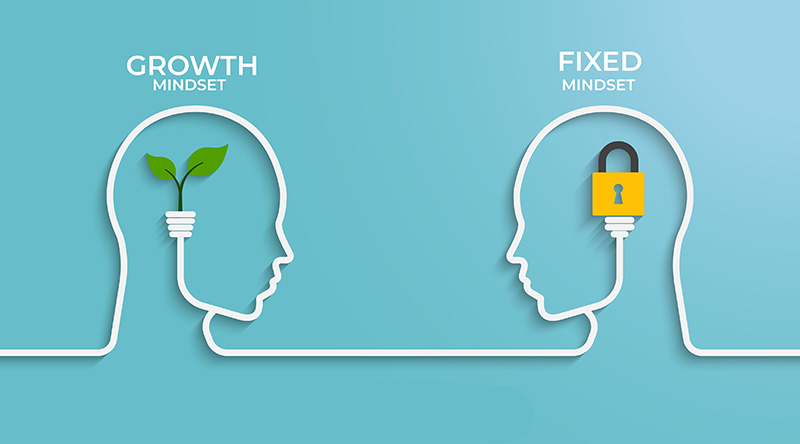
The Growth Mindset
So, what is a growth mindset?
As we proceed along in our personal and professional journeys, we can adopt one of two mindsets: a fixed mindset or a growth mindset.
A fixed mindset comes with the belief that skills and attitudes are static and unchangeable—one is either good at something or they are not. Adopting an all-or-nothing approach, individuals with this mindset often see challenges or setbacks as confirming a lack of ability or knowledge that they won’t be able to overcome. You may have heard others say—or have said yourself—things like:
- “I’m not good at this.”
- “I can’t do it.”
- “This is too hard.”
- “There’s no point in trying.”
- “I’m either good at it or I’m not.”
- “No, I don’t want to look stupid.”
On the other hand, a growth mindset embraces challenges, setbacks, and change as ultimately good things. In adopting a belief system centred on potential, individuals with a growth mindset take what may seem to many as negative or uncomfortable experiences and instead view them as valuable opportunities for improvement. If this is you or someone you know, phrases such as these may sound familiar:
- “I can improve with practice.”
- “Challenges help me grow.”
- “I embrace new experiences.”
- “I learn from my mistakes.”
- “I can always get better.”
- “Setbacks are learning opportunities.”
A reminder, if you hear yourself saying or thinking things that indicate a fixed mindset, don’t be discouraged! The empowering aspect of mindsets is that they are learned and can be transformed. Our brain, much like a muscle, can grow and strengthen with practice. By simply reframing your thoughts, focusing on perseverance and continued effort, you can shift from “I can’t do it” to “I can’t do it—yet.”

What are the benefits of adopting a growth mindset?
Developing a growth mindset can have a positive impact on many facets of your life, including enhancing your employability and professional development. For example, a growth mindset can supercharge your transition from university student to the world of work in areas such as:
- Adaptability: A growth mindset helps you respond to changes in a positive manner, making you more flexible and adaptable in an unpredictable and ever-changing job market.
- Resilience: Challenges and setbacks are an unavoidable element to anyone’s career. Viewing these as opportunities for growth and learning fosters resilience, enabling you to overcome them and persist as you proceed in your own career.
- Continuous Learning: Employers value proactive and responsive team members. A growth mindset encourages you to demonstrate this through continuously seeking knowledge and self-improvement.
- Networking and Collaboration: The ability to work well with others is crucial for success on the job and overall career advancement. Being open to new experiences and feedback naturally informs and strengthens professional relationships and teamwork.
- Confidence and Initiative: A growth mindset encourages you to take the initiative, which is attractive to employers seeking self-motivated employees. Independently managing demands and challenges also has a confidence-boosting effect. You’ll quickly notice that there is a strong overlap between these benefits and KSAs shared in the previous chapter. That shouldn’t come as a surprise, as your international learning experience is inherently linked to a growth mindset. Navigating different cultures, languages, and academic systems involves intentionally embracing difference and the discomfort of stepping outside what is familiar.
When a Growth Mindset Isn’t Enough
Sometimes the things that hold you back are not related to your attitude or talents; you may have encountered systemic or societal biases that give you negative messages about your qualifications or ‘fit’ for a job. There’s no harm in looking up a company’s record on inclusiveness and human rights. Apply to places that show their commitment to equity and inclusion. Look for these indicators:
- Written policies on inclusion and diversity.
- Initiatives that value difference, such as Black History Month or Indigenous Peoples Day events.
- Specific employee affinity groups that support LGBTQ2IA+ or racialized employees, for instance.
- Hiring initiatives or practices that specifically support and value diversity.
- Have premises that clearly provide accessibility aids (wayfinding in Braille, ramps, elevators)
- Look at a potential employer’s website or LinkedIn profile. Don’t rely on stock photos—do you see people like you in their current staff, leadership and clients?
Societal change is slow, but it’s never a bad idea to identify an employer that will value what you have to offer and who you are.
Learning Activity: A Growth Mindset and Growth by Changing Course
Take some time to reflect on one of the following prompts.
- Think of a time when you were stuck in a fixed mindset. Maybe you were having trouble learning something new, were told you were not good at something, or a job interview didn’t go well. Were you able to make changes and move forward?Think back on what you did, what you learned, and how you can continue to use your growth mindset when future challenges arise. Keep in mind that a growth mindset can also involve reassessing your goals and finding things that align more with your strengths (changing academic programs, choosing a company that values diversity, or shifting to a career that better matches what you have to offer).OR
- Consider a situation where you had difficulty because of barriers or a system that didn’t value what you had to offer. Can you reach out to a mentor or a trusted person who knows you for advice? What things can you look for in an employment situation that would show you that your attributes would be valued?Create a profile of an employer that would value the life experience and skill set you bring by listing its policies, resources, structure, and culture.

